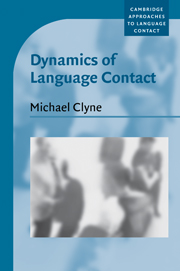Book contents
- Frontmatter
- Contents
- List of map and figures
- List of tables
- Series editor's foreword
- Acknowledgments
- List of abbreviations
- 1 Introduction
- 2 Dynamics of language shift
- 3 On models and terms
- 4 Dynamics of convergence and transference
- 5 Dynamics of transversion
- 6 Dynamics of plurilingual processing
- 7 Dynamics of cultural values in contact discourse
- 8 Towards a synthesis
- Notes
- References
- Index of authors
- Index of languages
- Index of subjects
Series editor's foreword
Published online by Cambridge University Press: 18 December 2009
- Frontmatter
- Contents
- List of map and figures
- List of tables
- Series editor's foreword
- Acknowledgments
- List of abbreviations
- 1 Introduction
- 2 Dynamics of language shift
- 3 On models and terms
- 4 Dynamics of convergence and transference
- 5 Dynamics of transversion
- 6 Dynamics of plurilingual processing
- 7 Dynamics of cultural values in contact discourse
- 8 Towards a synthesis
- Notes
- References
- Index of authors
- Index of languages
- Index of subjects
Summary
The series Approaches to Language Contact was set up to publish outstanding monographs on language contact, especially by authors who approach their specific subject matter from a diachronic or developmental perspective. Our goal is to integrate the ever-growing scholarship on language diversification (including the development of creoles, pidgins and indigenized varieties of colonial European languages), bilingual language development, code-switching and language endangerment. We hope to provide a select forum to scholars who contribute insightfully to understanding language evolution from an interdisciplinary perspective. We favour approaches that highlight the role of ecology and draw inspiration both from the authors' own fields of specialization and from related research areas in linguistics or other disciplines. Eclecticism is one of our mottos, as we endeavour to comprehend the complexity of evolutionary processes associated with contact.
We are very proud to add Michael Clyne's Dynamics of Language Contact to the ALC series. Focusing on Australia, and yet relating his findings to those of numerous other scholars on similar phenomena elsewhere, the author provides a most authoritative study on the impact of the dominant language (English in the present case) on other languages. This book is a meticulous documentation of language change under conditions of language shift, spanning several generations of immigrants from Europe, Asia and Latin America. It is a detailed analysis of historical, social and structural factors that bear differentially on how a language is affected by a dominant one, even when the systems are as closely related as are Dutch and German, and when, from the point of view of ethnicity and culture, their speakers can (for all practical purposes) be lumped in the same stock, as opposed to, for instance, the Vietnamese or the Chinese.
- Type
- Chapter
- Information
- Dynamics of Language ContactEnglish and Immigrant Languages, pp. xi - xiiPublisher: Cambridge University PressPrint publication year: 2003



